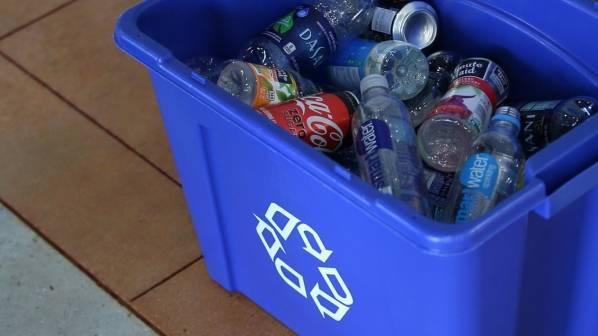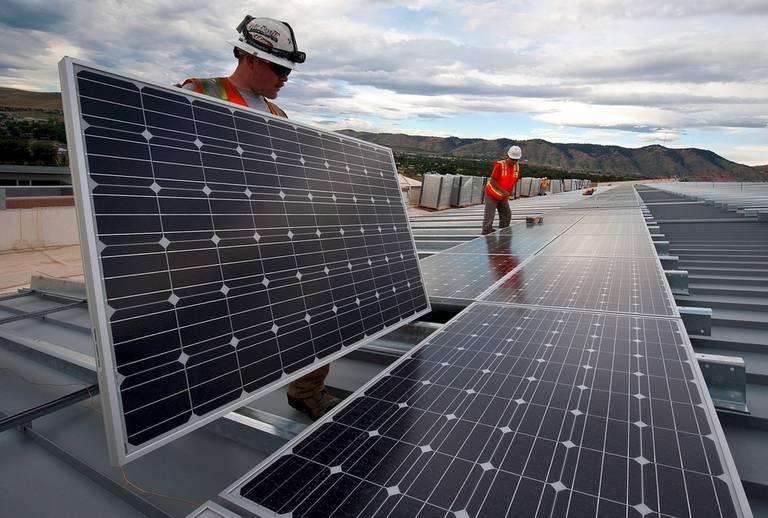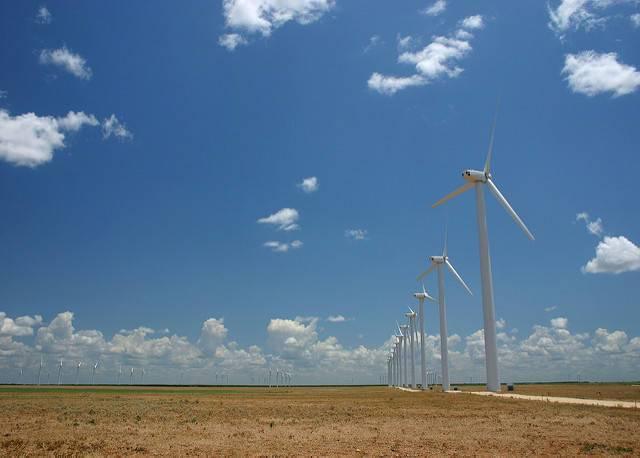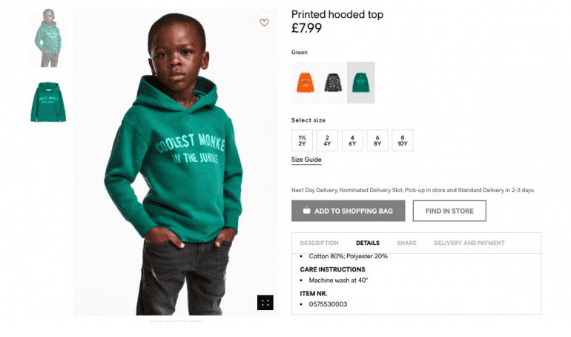Companies Worth $1.3 Trillion Pledge a Boost for the Circular Economy


We predicted earlier this month that business commitments to scaling up a global circular economy will be one of the biggest sustainability stories during 2018. An announcement made during this week’s World Economic Forum in Davos could help make zero-waste, closed-loop and circular economy supply chains more of a reality.
Yesterday, the World Business Council for Sustainable Development (WBCSD) announced that 30 companies across 16 industries will participate in the coalition’s Factor10 project. The initiative aims to persuade companies to adopt systems in which more waste is eliminated – or prevent the generation of garbage in the first place.
The economic case for reaping cash from trash is hardly new. The global accountancy Accenture, for example, estimated in 2015 that the worldwide circular economy comprises a potential $4.5 trillion in additional economic output by 2030. Tactics from improving recycling and recovery, to the adoption of digital products, as well as the development of products-as-a-service businesses, can all help reverse what Accenture concluded has been a “choke” on economic growth due to volatile raw material prices and more expensive disposal costs.
Companies participating in this partnership with WBCSD include BMW, Dow, ExxonMobil, Honda, Novartis Philips and Rabobank.
For businesses that are at the forefront of generating a truly effective circular economy, the rewards could be great, and not just in the remunerative sense. As more consumers base their purchasing decisions on which companies they believe are the most sustainable, brands that are breaking new ground on waste diversion efforts could see themselves as leaders. After all, the “hard stuff,” like committing to clean energy or reducing greenhouse gas emissions, has already been done. The same goes for companies pledging supply chain transparency and a respect for human rights – if your company not started such programs, then you are already left behind.
But a push to not only reduce, but eliminate, waste offers opportunities for companies to show how they can innovate while boosting their sustainability chops.
The sword, however, cuts both ways.
Companies that fall short in this initiative, and will not be able to show any progress on the circular economy front over the next several years, could be seen as laggards, or in the worst scenario, find themselves accused of “greenwashing.” For companies participating in this initiative, including ExxonMobil with its lucrative plastic industry, they could find themselves stuck with the reputation of yet again talking the sustainability talk but doing little to walk that walk.
Watch for more companies to put themselves out there and declare circular economy plans, even though these programs face a bevy of challenges, ranging from the scaling up the recycling of materials like plastics, to convincing their customers and partners to buy be willing participants in this transformation.
Nevertheless, more brands are embarking on their circular economy journeys anyway. This month, Evian announced it would have a closed-loop system in place by 2025. And last summer, UPS and TerraCycle offered proof that similar plans could work, as the companies announced they had successfully diverted 40 million pounds of waste from landfills due to their partnership.
Image credit: Bo Eide/Flickr
Coca-Cola Launches One-for-One Global Recycling Plan


More companies are launching zero-waste, closed-loop or circular economy waste diversion programs, but communicating the importance of this effort to consumers is not always easy. After all, with the exception of professionals deeply vested in the sustainable business space, those aforementioned terms really do not mean anything.
But what about simplifying the terminology so that consumers not only grasp these waste reduction and elimination programs, but to actually become inspired and participate as well?
Coca-Cola is attempting to harness such enthusiasm by announcing a one-for-one recycling plan.
According to the company, Coca-Cola aims to recycle one bottle or can for every single one that it sells by 2030.
Coca-Cola is calling this campaign “World Without Waste,” based on the premise that consumers are used to having convenient and lightweight food and beverage containers readily available. The problem, however, is that too much waste is being generated worldwide. Now Coca-Cola says it wants to be part of the solution.
Coca-Cola has been among several high-profile companies targeted by Greenpeace over what the environmental NGO says is the company’s ongoing contribution to the pollution created by the surge in single-use beverage containers.
To answer any critics, Coca-Cola has developed a two-part recycling strategy. First, the company says it will invest some of its marketing budget into educating customers how and when to recycle. In addition, Coca-Cola claims it will make all of its packaging 100 percent recyclable worldwide, while having all plastic bottles be comprised of 50 percent recycled content by 2030.
Not everyone is impressed with Coca-Cola’s plan. "Instead of focusing on reducing the amount of plastic it produces, the surefire way to reduce ocean plastic pollution, Coca Cola is trying to offset its huge plastic footprint by investing in a bit more recycling," Louise Edge, a campaigner for Greenpeace United Kingdom, said in a statement sent to CNN.
Greenpeace says that as the company is responsible for producing 100 billion plastic bottles annually, it should take more responsibility for the overwhelming amount of waste it is creating. Last summer, the NGO’s Canada chapter launched a social media campaign that urged followers to take photos of discarded Coca-Cola bottles in a move to publicly shame the company to boost its waste diversion programs. A similar signature collecting campaign that is still running has gained the support of over 500,000 people.
Coca-Cola says it addressing those criticisms, and will work with several global partners to make this promise a reality. Organizations include the Ellen MacArthur Foundation’s New Plastics Economy initiative, The Ocean Conservancy/Trash Free Seas Alliance and World Wildlife Fund. The company will also launch start education plans with new partners at the regional and local levels in order to find new ways that could inspire consumers to recycle more packaging.
Image credit: Coca-Cola
Real Estate Investors Finally Consider Climate Risks


Mar-A-Lago-Climate-Central-Nickolay-Lamm
By Joyce Coffee2017 was quite a year for extreme events. Shocks and stresses from 16 events that each triggered over $1 billion in damages and took their toll on lives and livelihoods in the United States alone. And it wasn't just hurricanes, although Hurricanes Irma, Harvey and Maria played their part (with damages of $161 billion, $102 billion and $45 Billion respectively). Many other climate- and weather-related disasters hit the U.S., including hail and ice, heat and wind, and inland flooding.
Many experts predicted this was likely – and I don’t mean the climate scientists. The Global Risk Perception Report – the latest of which came out last week – has for the last five years included the failure of climate change mitigation and adaptation on its list of the five global risks in terms of impact. It bases its list on survey data from about 1,000 World Economic Forum advisors worldwide. Other risks in that set also are climate-related such as water crises, major natural disasters and extreme weather events.
Plus, the stakes are high for the real estate industry. The UNFCCC 2016 Biennial review of climate finance notes that $35 trillion in real estate assets will be at risk in 2070 if we make no changes to our current carbon emission trajectory. That figure represents about half of today’s global assets under management in any industry sector.
But how do these risks relate to the U.S.? The shocks of powerful storms can destroy many of those assets, as the devastation from this year’s climate disasters reminds us. Longer-term changes in temperature can cause other shifts. Even from where I sit in the middle of the country in Chicago, we are in the midst of a shift to a climate that will look more like New Orleans by the end of the century.
So, there are both orderly shifts and shocking disasters occurring because of our changing climate, and I think one question we want to ask is: What does that mean for our shift as investors? Will it be orderly or will it be a flight?
We can't say we haven't been warned. This analysis from Zillow shows that if we have sea level rise of six feet – predicted by the end of the century along much of the U.S. coast – we lose houses worth roughly $900 billion in value. And this applies just for coastal properties. It doesn’t include other risks such as inland flooding and fire that also loom. It also doesn’t value the PTSD, injuries, loss of life, loss of community and livelihoods that these figures suggest.
These data came to mind as I was preparing to speak at this week’s National Association of Real Estate Investment Managers Sustainability and investment Summit, whose tagline is “License to Think in Public.”
One of the most thought-provoking data I shared: U.S. counties facing the greatest risk from natural disasters have the highest and quickest rising home values. Counties with the very high risk from these disasters have seen a 55 percent appreciation in their already very costly homes in the last 5 years.
The U.S. finally received the much-anticipated Multihazard Mitigation Council’s latest cost benefit analysis, illustrating that, on average, every dollar invested in disaster mitigation pays back $6.
In the meantime, as my fellow panelist Chris Smy, Global Practice Lead at Marsh Inc., noted, the stakes are high as insurance companies, by and large, do not price their policies according to the longer-term climate risks, and developers persist in going where the money is, which is along the coast.
Yet Darob Malek-Madani with National Real Estate Investors showed that some investors are taking notice. His firm finished a study that convinced them to no longer invest in Miami. Except for the financial situation of the state and city, he said, they might even prioritize Chicago.
Jack Davis – RE Tech Advisors and a resilience leader with Urban Land Institute – reminded us that the stakes go well beyond real estate. As the New York Times reported last year, gross domestic product, especially in the Southern states, is predicted to record losses of 10-20 percent of GDP, hitting the poorest residents hardest.
I thought that when real estate investors bring equity questions to the table, we can perhaps sense a shift underway. Certainly, the investment community at large is more vocal about the risks than in the past, though silent on the equity questions. The Financial Stability Board’s Taskforce on Climate Change-related Financial Disclosure (FSB-TCFD), led by Bank of England Governor Mark Carney and Michael Bloomberg, is developing climate-related financial risk disclosure commitments for companies. The big guys, though, are not waiting for that guidance to disclose. My library is filling with articles that say what BlackRock demonstrates: Their investment stewardship features climate risk disclosure as a key priority.
While my climate resilience colleagues often ask where we can find financing for climate resilience, this group of investment managers brought a fresh spin to the money question: How can we avoid future investments in risky properties? Both questions are valuable, and it’s great to see some in the real estate industry “thinking in public” about how to make this market transformation happen.
Joyce Coffee, LEED AP, is Founder and President of Chicago-based Climate Resilience Consulting.
Nike's Huge Renewable Energy Buy Pours Cold Water On Trump's Coal Goals


Nike dropped something of a renewable energy bombshell last week, just as President Trump was gearing up to celebrate his first year in office. The leading global athletic wear company announced a huge 86-megawatt deal that throws the force of Texas wind power behind its pledge to bring 100 percent of its North American operations into the renewables fold by 2025 -- seven years earlier than planned.
Talk about raining on the fossil fuel parade! All during his successful campaign for the Oval Office in 2016, Trump convinced coal miners and coal communities that he would revive the coal industry. However, facts on the ground continue to demonstrate that the renewable energy transition is inevitable.
Why renewable energy wins
Nike garnered a windfall of good press from the new wind power deal, and that's one good reason why fossil fuels can't compete. It's unlikely that a fossil fuel power purchase would make national news headlines (and subheadings) that polish a brand's public image. Here's a sample from CNBC:
Nike just inked a big wind power deal in TexasThe Portland Business Journal also weighed in with "Nike hits 100% renewable energy landmark with Avangrid Renewables deal in Texas," and the lede:Nike wants all its electricity to come from renewable sources by 2025
Its sustainability officer says investing in renewable energy is good for the planet and business
An agreement to buy power from a planned Avangrid Renewables wind farm in Texas will take Nike Inc. to 100 percent renewable energy for its North American operations, the company said Thursday.
Nike's new wind power deal consists of an 86-megwatt power purchase agreement for the Karankawa Wind Farm in Texas, which is a 286 megawatt project developed by Portland-based Avangrid Renewables.
Even with the 2025 goal in hand Nike still has global manufacturing supply chain issues to resolve, but the company has developed a strong sustainability profile that includes materials innovation, advanced manufacturing, water conservation and green chemistry pathways among other steps.
Corporate America abandons coal
The Portland Business Journal piece cited above fleshes out the symbiotic relationship between U.S. corporations and renewable energy developers. Here's a snippet:
Last year, Avangrid Renewables completed work on what is now Oregon’s biggest solar power plant, with the power going to Apple Inc., and began construction of an Oregon wind farm that will also deliver power to Apple. It also began providing energy to Amazon Web Services from a new North Carolina wind farm, and announced a deal with Google for power from two planned South Dakota wind farms.
That's just one small example of a much broader trend tracked by TriplePundit among many other media organizations.
Aside from the advantage of green branding, one good argument for renewable energy is the stability of energy expenses -- after all, once the solar panels or wind turbines are installed, the fuel is essentially free.
With the advent of advanced energy storage, reliability of supply is another bottom line factor in the plus column for renewables.
More recently, wind and solar costs have dropped so low that they are competing on price in some markets, too.
In another bad sign for US coal, the International Renewable Energy Agency (IRENA) foresees price parity globally between renewables and fossil fuels by 2020.
A recent IRENA report on global energy costs puts onshore wind power in the catbird seat already:
The report highlights that onshore wind is now routinely commissioned for USD 4 cents per kWh. The current cost spectrum for fossil fuel power generation ranges from USD 5-17 cents per kWh.
Here in the U.S., renewable energy stakeholders got some good news when the Federal Energy Regulatory Commission gave a thumbs-down to a Trump administration proposal that would have protected uneconomical coal and nuclear power plants.
That proposal came from the Energy Secretary Rick Perry, but it looks like a case of 'do what I say, not what I do.' While Perry has been toeing the Trump line in some regards, the Department of Energy has been vigorously promoting the U.S. wind industry all year long.
The Interior Department also has a hand in the renewable energy mix. Interior Secretary Ryan Zinke has come in for his share of criticism on every side from Hurricane Maria grid recovery to drilling on public lands, but his agency has moved forward on offshore wind energy leases.
Photo: Avangrid wind farm in South Dakota.
Trump Administration's Massive Tax on Imported Solar Panels


By Bob Keefe
We all want to buy American.
But, President Trump’s decision Monday to impose a massive 30 percent tariff on imported solar panels will cause far more harm than good – for jobs, for our environment and for America’s ability to lead on clean energy.
The facts are simple.
Nearly 374,000 Americans now work in full or part-time jobs the solar industry. The vast majority of them work in installation, project design and management, sales and related fields. Only about 8,000 work in manufacturing.
The trade group Solar Energy Industries Association (SEIA) estimates that a 30 percent tariff on imported panels would kill more than 88,000 good-paying jobs in the solar industry, just to satisfy the legal complaints of two solar panel manufacturing companies that together employ about 400 people. Putting a tariff on imported solar panels right now is like putting the fastest-growing position in America – solar technician – on the bench, just to get a five-yard penalty on the other team.
Like it or not, the majority of solar panels are manufactured overseas, just like the majority of our computers, cellphones, clothes and other goods are manufactured overseas. Imagine suddenly levying a 30 percent fee on Apple or Verizon just because their phones and laptops are made (and assembled) in Asia. Doing so would drive up consumer costs, hurt sales and threaten jobs here in America.
Nevermind that the two solar panel companies that asked the U.S. International Trade Commission for tariffs on cheaper foreign-made panels are actually owned by foreign companies. Suniva is majority owned by a Hong Kong company (that opposes tariffs), while SolarWorld is a subsidiary of a German conglomerate. Suniva declared bankruptcy last year; SolarWorld’s parent has said it is technically insolvent, according to SEIA.
To be sure, levying tariffs on foreign solar panels is an easy way for President Trump to appeal to his base. It’s also another way the Trump administration can continue its unfortunate practice of propping up the coal and petroleum industries while throwing up roadblocks for clean energy and the more than 3 million Americans who now work in renewable energy, energy efficiency and other clean energy fields.
Solar companies and their employees are bracing for the pain that will follow President Trump’s decision.
"The possibility of tariffs on foreign solar panels is a huge weight hanging over our heads,” said Mark Bortman, founder of Exact Solar in Pennsylvania. “The uncertainty has already forced us to delay hiring and expansion plans. If tariffs or quotas are imposed, layoffs and contractions are a real possibility.”
Whitney Painter, owner of Buglet Solar Electric based in Golden, Col., agrees.
“Solar is the cheapest and fastest-growing energy source on the planet, and one of the top sectors of job growth in the US,” she said. “A solar tariff would cause solar panel prices to spike domestically, and hurt my solar business in Colorado, as it would many other solar businesses across the country. American interests will not be served by using tariffs to decimate our solar industry.”
It’s not just solar companies and entrepreneurs who realize a tariff is a bad idea. More than 350 business owners, investors and other professionals across all industries recently signed this letter from E2 asking President Trump not to hurt our economy and our environment with a solar tariff.
American business leaders understand that jacking up the price of solar panels with a tariff would kill jobs and hurt our economy. They know it means consumers would be forced to remain shackled to electricity from coal or gas or pay a lot more for clean, renewable energy from the sun. They know it would hurt innovation in the energy industry.
They also know that tripping up clean energy growth with something as silly as a solar panel tariff would hurt our environment. One average-sized residential solar power system can reduce carbon pollution by an estimated 200,000 pounds over 25 years. That’s the equivalent of planting more than 2,300 trees or reducing the equivalent C02 emissions from burning nearly 100,000 pounds of coal.
President Trump says he cares a lot about creating jobs and driving economic growth. Levying tariffs that will slam the brakes on the fastest-growing jobs in America isn’t going to get it done.
Bob Keefe is executive director of E2 (Environmental Entrepreneurs) a national, nonpartisan group of business owners, investors and others who advocate for policies that are good for the economy and good for the environment. E2 members have founded or funded more than 2,500 companies, created more than 600,000 jobs and collectively control about $100 billion in venture and private equity capital.
Comprehensive Strategies for Promoting Educational Equity


By Daphne Stanford
As reported by NPR, Baltimore’s public schools closed in early January due to unusually low classroom temperatures that local teachers dubbed “inhumane” — dipping near 40 degrees. One student told her mother that she couldn’t feel her toes at one point; another student said, “As of now, I have on four shirts, two hoodies, and a jacket. It’s kind [of] hard to get comfortable when you’ve got so many layers on and you’re not used to it and you’re still cold.” If this isn’t illustrative of educational inequity and infrastructure funding problems on a major level, I’m not sure what is.
Private Enterprise & Public Education
How can private enterprise and public education work together to promote sustainability and educational equity on a basic, structural level? Will it take applying for micro grants for renewable energy installations and school gardens — or is the prospective solution larger and more comprehensive than that?
Elizabeth Ferruelo is an educational entrepreneur: that is, she launched the social entrepreneurship thinkCERCA, a digital learning program that utilizes AI to teach argumentative writing in a way that adapts to every student on an individual level. The differentiated, self-paced instructional model allows students to utilize their critical thinking skills, making room for teachers to orchestrate classroom discussions based around the subject material.
Ferruelo acknowledges the tension in running a social business — as opposed to a nonprofit organization. In the educational sphere, this type of partnership between companies and schools is considered by many to be anathema to public education. However, the persistent problem of overcrowded classrooms makes individualized literacy teaching difficult for teachers with an average of 28 students per class, as is the case with sixth grade classrooms in California. Under these circumstances, an outside-the-box solution like AI-based software seems worth a try.
Classroom Conversations About Social Change
With all these odds piled up against the interests of public school students, how should we frame discussions of educational equity and a sustainable vision of democratic school models? Perhaps we should start by asking the students. Teachers can inspire social change in the classroom by not only discussing issues like school heating and curriculum supply budgets, but also putting these problems forth as part of a real-world curriculum that favors student voices, communication, empathy, creativity, and consensus-building.
In this way, students can address the question of social change both inside and outside the classroom — offering them a chance to see democracy at work in their own lives in a real and practical way. For example, Vox’s recent study on racially-motivated school zoning practices would be a great problem-based learning topic for discussion in a high school civics or government class — if civics were still widely taught as an individual class. Although all 50 states require civics or government instruction, factual learning is seldom accompanied by real-world learning opportunities.
The kind of systemic change that is required in public schools has been recognized by educators like Carl Hermanns, who specializes in educational leadership at the post-secondary level. Hermanns got involved through starting an after-school community music in San Diego while on staff with the San Diego Symphony. His exposure to the second-grade classroom that had lost its funding for music education inspired him to get involved with education at a hands-on level.
Like many who start out in education, Hermanns returned to the field after twenty years in the music world with a renewed interest in the needs of public schools after being exposed to them face to face — rather than merely reading about them in the news. How can more of us get involved with our local schools in order to increase students’ connection between their classroom curriculum and the larger communities in which they live?
School Nutrition Standards
The Trump administration’s rollback of Obama-era nutrition standards for school lunches does not bode well for children’s equity or health, nationwide: for example, rather than the proposed guideline of 935 mg of sodium, school lunches for elementary school students will now be eased to 1,230 mg – something Margo Wootan says “will be locking in dangerously high sodium levels in school lunch.” How can we change this?
Nutritional recommendations for what to pack for lunch the night before — which ideally includes a balanced food pyramid consisting of whole grains, fruits and vegetables, and healthy fats — assumes students have the resources to do so in the first place. Ideally, The School-Based Health Alliance and other related organizations step in to provide healthy food choices where public programs fail.
However, in a nation where an all-time high GDP of more than $18 billion was reached in 2016 — easily maintaining our lead as the richest country on the planet—why is it that we can’t manage to adequately feed our children or heat our schools? Private and nonprofit organizations have been attempting to help stop the gap, but sustained attempts at damage control do not make up a sustainable system.
* * *
How can nonprofit organizations, private enterprise, and public government work together to transform education? Will it take a massive upswing in the number of school-managed community gardens and partnerships with local farms and school cafeterias? How can we change our “second-tier nation” status for the good of our children’s future, rather than our national ego?
Share your thoughts and suggestions about educational equity from a CSR and sustainability perspective in the comments section, below.
* * *
Image Source: PixabayDaphne Stanford hosts “The Poetry Show!” on KRBX, her local community radio station, every Sunday at 5 p.m. A writer of poetry, nonfiction, and lyric essays, her favorite pastimes include hiking, bicycling, and good conversation with friends and family. Follow her on Twitter @TPS_on_KRBX.
Nike Leaps Forward on Renewables


Among the companies jumping on the RE100 bandwagon is Nike, which two years ago made a pledge to run 100 percent on renewables by 2025. Recently the footwear and athletic apparel company has announced it has completed a huge step in coming closer to that goal since it joined the RE100 coalition in 2015.
The global initiative, a partnership between CDP and The Climate Group, counts on companies as diverse as Ikea, Coca-Cola, GM and Salesforce to boost demand for renewables worldwide. The four-year-old program is built on the premise that as the private sector consumes half of the world’s electricity generated worldwide, more cooperation is needed to remove barriers to harnessing clean energy technologies in order to reduce dependence on fossil fuels and decrease climate change risks.
Nike’s latest agreement is yet another wind power contract with Portland-based Avangrid Renewables. The company says the power purchase agreement (PPA), which will be sourced from a soon-to-be-built wind farm in Texas, will provide the equivalent of more than 400,000 average-sized American homes with safe and secure clean power. Nike also claims that the contract will result in carbon emission reductions equal to approximately 800,000 vehicles taken off the road during the life of the contract with Avangrid.
This latest contract builds upon the company’s first agreement with Avangrid signed during summer 2016, which provides 100 percent renewable power to the company’s Beaverton, OR headquarters along with other buildings the company occupies across Oregon. Together, Nike says these two PPAs has helped the company achieve over 50 percent of its RE100 goals while ensuring that all of its operations across North America run entirely on renewables.
In total, Nike says it will generate 5,000 gigawatts of power under the terms of the agreements made with Avangrid. While the company says it does not have any specific numbers at this time, it expects this recent PPA to serve as a revenue generator for Nike.
Nike claims it is the first company in this space to make such a large commitment to purchase renewables. “This matters to us because it’s a path critical to our business, the planet, and the future of sport and all athletes,” said Cyrus Wadia, Vice President, Sustainable Business & Innovation of Nike, during an interview last week with TriplePundit.
Wadia explained that deals like this are critical to Nike protecting its business for the long term, as the company has already seen evidence that pollution and climate change are already starting to have an impact on athletics. After all, climate change can wreak havoc on athletics worldwide, from calls to cancel a half-marathon in India last autumn due to air pollution, from the threats that a warming planet could pose to winter sports.
“In sport, we have got to get out in front of this issue,” said Wadia. “Because the impacts will be felt in some places sooner than others worldwide, and we want to be part of the solution.”
For years, Nike has been a trendsetter when it comes to sustainability within the apparel sector, notably with its constant experimentation with recycled materials such as leather. Now, the focus has been shifting to renewables and energy efficiency. A distribution center in Belgium, for example, has run 100 percent on clean power while incorporating a bevy of green building features. The company has also participated in the Department of Energy’s Better Building Challenge in a drive to reduce the energy intensity of its buildings by 20 percent.
These wind power contracts, however, comprise the most ambitious clean technology project Nike has launched this decade.
“We’re committed to this RE100 challenge, and we’re proud that we’re already 50% of the way there,” said Wadia as he concluded his interview with 3p. “All of North America is covered, and as we’re on our way, we hope these ripple effects have impact across our industry and beyond.”
Image credit: Flickr/FieldsBH
Citigroup Promises to Narrow Gender Gap, But the Divide is Still Wide


Responding to the investment management firm Arjuna Capital, the global financial giant Citigroup announced earlier this week that it would close the gender pay gap in three countries where it conducts business.
While the bank claimed that the pay gap between women and racial minorities compared to white male employees was only 1 percent in the U.S., United Kingdom and Germany, Citigroup nonetheless said it would work to equalize compensation across the company.
As noted on publications including Fortune, banks are often the worst offenders when it comes to the pay gap between men and women. In the U.K., for example, Arjuna cited research saying that they divide between male and female banking employees could be as wide as 24 percent.
Citigroup has claimed that “pay equity is an importance principle” at the company, and also touts unconscious bias training and employee peer networks as steps it has taken to ensure a fairer workplace. Other banks, such as Bank of America and JPMorgan Chase, have also said they are aggressively taking on gender pay equity.
But according to Arjuna, the words banks have been saying are often not matched by deeds. Shareholders of several of the largest financial institutions in the U.S. rejected proposals last year that would have mandated reports detailing the pay gap based on gender, race and ethnicity.
And it is not much better across the pond, as Quartz has reported that female employees at the Bank of England earn on average 20 to 25 percent less than their male counterparts in salaries and bonuses. Yet that divide is even better than the entire U.K. financial industry as a whole, which reports an aggregate gap of over 30 percent.
Observers of the industry are dubious that Citigroup’s gesture will go very far. As reported on Bloomberg, the company is due to report another gender pay assessment, and that gap is expected to be wider than what was addressed this week. Industry experts generally agree that Citigroup’s overall track record is more progressive than the rest of the finance industry.
“Citigroup is stepping into a leadership role on the gender pay gap that we have not seen from any of its U.S. financial peers,” said Natasha Lamb, managing partner at Arjuna in a public statement. “Other leading banks can either follow Citi’s example on gender pay or risk further laggard status on issues of concern to women.”
One problem with addressing the global pay gap between men and women is that most companies are reluctant to publish this data in the first place. According to Bloomberg, less than 600 out of 9000 companies in the U.K. have not publicly disclosed such information because bottom line, the results are “embarrassing.” Hence for those seeking fairness in the workplace, they have a huge hurdle to overcome: transparency.
Image credit: Tony Webster/Flickr
H&M Struggles Repairing a Battered Reputation in South Africa


To say H&M has had a difficult week is putting it mildly. As widely reported, the fast fashion retailer temporarily closed its 17 stores in South Africa after outrage over an advertisement in which a young black child was shown sporting a sweatshirt emblazoned with the words “Coolest Monkey in the Desert.” Outrage quickly spread digitally across social media and in person outside of H&M’s South African locations. The stores were overwhelmed by demonstrators who toppled displays and left piles of clothing behind in protest; even though the stores are still closed, as of press time protests were still continuing.
H&M tried to apologize and staunch the controversy, but those words were far too late for those angered by another tone-deaf ad – not to mention how people of African descent are fed up with the centuries of simianization that has long festered in popular culture.
It didn’t matter that the child model’s family, who lives in Sweden, defended the sweatshirt ad. Critics of the company are asking why this ad campaign was not thoroughly vetted. Furthermore, South African law has set a low bar when it comes to determining when a person or entity makes a racist remark – hence not only has this sweatshirt ad put H&M’s reputation on the line, but has hurled the company in legal trouble as well.
Over the past week, H&M agreed it would present South Africa’s human rights monitor with a plan to address the outrage the sweatshirt advertisement quickly sparked. One group that has been leading protests against H&M, the Economic Freedom Fighters, has so far refused to attend such meetings.
It is also important to remember that this episode was not the first time H&M has been lead-footed with how it has marketed its products in South Africa. In 2015, when the company was called out for not showing any black models at its stores, H&M’s South African Twitter account responded that the retailer was striving to convey a “positive image,” whatever that meant:
[embed]https://twitter.com/hmsouthafrica/status/661156658316464128?ref_src=twsrc%5Etfw&ref_url=http%3A%2F%2Fwww.huffingtonpost.co.uk%2F2015%2F11%2F09%2Fhm-south-africa-apologise-diversity_n_8508686.html[/embed]
As one columnist noted, “Marketing campaigns are meant to drive as many people as possible through the door, yet in 140 characters H&M South Africa alienated the country’s 80% black population.”
It will be a tall order for H&M to rebuilt its reputation in South Africa. The fast fashion pioneer joins a long roster of companies accused of being racist or at a minimum, clueless – troubles that have sidetracked brands from Dove to Airbnb.
But the lesson of this story is that companies need to be agile in how they can address such firestorms, says one author.
“H&M is a classic example of the velocity with which today’s web-enabled auditors of corporate behavior can create a global movement when their expectations are not met,” said Barie Carmichael, who recently co-wrote a book advising businesses on how to adapt within today’s social landscape. “The focus has shifted to the company behind the brand, requiring companies to break out of the powerful insularity of the corporate cultural bubble.”
Local media reports say H&M will soon launch anti-racism programs; but it has been too late for some celebrity endorsers who have quit their partnerships with the company.
Image credit: H&M
Tired of Being Ignored by Zinke, NPS Advisors Quit


Buried in the brouhaha over Stormy Daniels and a far larger storm, the yet unresolved government shutdown, came news from the National Park Service (NPS).
Former Alaska Governor and now former chair of the NPS Advisory Board, Tony Knowles, announced that he and seven other board members have quit their positions. Two other members of the advisory council submitted letters of resignation separately.
The reason? “Our requests to engage have been ignored and the matters on which we wanted to brief the new Department team are clearly not part of its agenda,” wrote Gov. Knowles in a public letter to Secretary of the Interior Ryan Zinke.
Knowles and his fellow board members said their concerns spanned a wide variety of issues, from scientific research to climate change to educational programs that could have involved the NPS. The board, which was first established in 1935, is supposed to convene twice a year. But according to the Washington Post, the group has not met at all since President Trump took office a year ago.
In the meantime, board members said they never received a response from Zinke after several attempts at outreach. And the silence continued, despite the fact the NPS is tasked with managing some of the most cherished American icons, from Yosemite to Yellowstone to the Statue of Liberty.
It is important to remember that the NPS is an economic engine in addition to a steward of the environment and caretaker of historic sites. The agency has claimed a role in supporting local businesses, with 331 million park visitors in 2016 supporting over 318,000 jobs and almost $35 billion in economic output.
Knowles also said in an interview with Alaska Public Radio that in addition to the Interior Department’s lack of interest in the advisory board, the agency also suspended regulations covering biodiversity loss, pollution and climate change.
The past year has found the NPS and public lands managed by other agencies caught in the cross-hairs of the Trump Administration. For example, the White House had proposed steep increases in entrance fees at some of the country’s more popular parks; the public comment period was extended to December after public outcry. And the Department of Interior’s decisions, which ranged from expanding drilling rights to attempts to sell 3.4 million acres of federal lands, have sparked grassroots protests – and also scored the rebuke of companies including REI and Patagonia.
Explaining her reason for quitting, board member Carolyn Finney, a geography professor at the University of Kentucky, wrote in an op-ed to Newsweek that she was weary of “the unwillingness of the new interior secretary to engage with us and hear about the work that so many individuals around the country are doing to care for the national parks and each other.”
Now the NPS is left without any advisory panel tasked with designating future national parks to protect additional historic sites or natural landmarks. And therein lies the agenda of the Trump Administration, which has largely suspended or ignored such citizen panels, relying on allies such as Zinke and his supporters to make decisions instead - without engaging the public and other stakeholders. “The hindrances advisory bodies have faced fits a larger theme of the Donald Trump presidency, which has been steadfast in its anti-environment approach,” concluded Charlie May for Salon.
Image credit: Leon Kaye